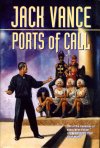 | |  |  |
 Linked titles can be ordered from Amazon.com Books. Or see SF specialty and independent bookstore links. Prices shown are list. Linked titles can be ordered from Amazon.com Books. Or see SF specialty and independent bookstore links. Prices shown are list. |
Recent New and Notable
5 Apr 1998 |
Children of God, Mary Doria Russell (Villard, Mar 1998, $23.95, hc) The sequel to the author's acclaimed, Tiptree-award winning first novel The Sparrow, about a Jesuit priest confronting newly discovered alien races. This book follows Father Emilio Sandoz on a return trip to the planet Rakhat, where its two native races, the carnivorous, dominant Jana'ata and the communal, vegetarian Runa are being transformed. Russell Letson, who found the first book ''superb'', writes in the March 1998 Locus Magazine:
...this is not a book about easy faith, or God as a nice guy. This is the God of Job, and his world is a moral thicket, a vale of tears, a place of terrors and wonders almost beyond human understanding. You don't have to be a believer to find Russell's portrait of courage and endurance and humanity (among aliens as well as humans) both moving and exhilarating.
|
 |
Dragon's Winter, Elizabeth A. Lynn (Ace, Apr 1998, $21.95, hc) The author's first novel in over a decade and first in a new fantasy series, this book explores themes and images classic to High Fantasy: kings, dragons, evil wizardry, daring warriors. The main character, Karadur Atani, is a dragon-king and changeling who is unable to shapeshift into reptilian form. Faren Miller writes in the March 1998 Locus Magazine that the book is not
...an unimaginative exercise in tradition, for Lynn introduces considerable moral complexity, and uses elements of myth to invoke individual, political, and social crises as relevant for today's reader as they are for her often troubled characters.
She concludes: ''Enough for now to welcome back the intelligent, tough but lyrical, writing of Elizabeth Lynn, who brings her fantasy world very much alive in a narrative notable for its lack of authorial excess.''
|
 |
|
Ports of Call, Jack Vance (Tor, Feb 1998, $23.00, hc)
A light space adventure in the mode of a Wodehousean comedy, about various individuals who ''just happen to own (or long for) yachts that flit through space and hop from planet to planet in the course of their journeys to many ports'', as described by Faren Miller in the February 1998 Locus Magazine. The book is picaresque, colorful, vivid, and perhaps the beginning of a series of indefinite duration. ''Authorial maturity, like well-aged whisky, can offer a remarkable combination of meriment, philosophical musings, and a wicked bite. We get all three in Ports of Call.''
|
 |
A Scientific Romance, Ronald Wright (Picador, Mar 1998, $23.00, hc) The term ''scientific romance'' was used in Britian during the first half of the 20th century for the variety of what we now call SF that was distinct from the American pulp-magazine derived SF -- the British progenitor being, of course, H. G. Wells. Ronald Wright is an Englishman living in Canada with a reputation as a popular historian and travel writer, and this, his first novel, recognizes the tradition in tributes not only to Wells but to Mary Shelley, M. P. Shiel, and Richard Jeffries. The story is about a historian, Lambert, who discovers a letter from H. G. Wells himself, promising that the real time machine was actually invented and was set to arrive at midnight, December 31, 1999. Lambert witnesses the arrival of the machine, and then takes it for a spin to the year 2500. Gary K. Wolfe, writing in the February 1998 Locus Magazine, finds the book impressive to a point; by the end, clichés of scientific romance predominate:
Despite some neat ironies near the end as Lambert discovers helplessly the troubles his disappearance caused for his friend Bird, despite some lush and evocative prose, despite the novel's rich intelligence, A Scientific Romance finally leaves us with little that is new, and a kind of unfulfilled longing not unlike that which drove lambert into the future in the first place.
|
 |
|  |



